As the civil war in Burma or Myanmar enters its third year, all indicators are pointing towards a continued stalemate between the conflict parties leading to the war of attrition.
.
The U.S. Intelligence Community report said that the stalemate is likely to continue if the ethnic-democratic alliance forces, which are made up of Ethnic Armed Organizations (EAOs) and National Unity Government (NUG)’s armed wing People’s Defense Forces (PDFs), are not given a hand to combat the military junta to change the balance of power to their favor. Likewise, the Armed Conflict Location & Event Data Project (ACLED) in its report of 2023 Conflict Diagnostic – The Civil War in Myanmar; and recent remarks made by Noeleen Heyzer, Special Envoy of the UN Secretary-General on Myanmar at General Assembly were all of the same opinion that the end of civil war is nowhere in sight and it would probably go on unabated.
ODNI
According to the Annual Threat Assessment of the U.S. Intelligence Community, Office of the Director of National Intelligence (ODNI) February 6, 2023, page 35:
“Protracted violence between the Burmese junta and its prodemocracy opponents probably will sharpen as neither side has the military capability to win outright in the near future, and both sides increasingly see their conflict in existential terms, effectively precluding compromise. A breakdown in military cohesion or significant changes in external support to either side—particularly to the anti-regime forces—probably are needed to produce the conditions required for a military victory or a political agreement. Ongoing violence, combined with a deteriorating economy, is likely to continue the ongoing humanitarian and human rights crisis, with implications for Burma’s cohesion as well as regional security.”
Moreover, in the report’s introduction a passage which might be linked to the situation in Burma writes:
“Efforts by Russia, China, and other countries to promote authoritarianism and spread disinformation is helping fuel a larger competition between democratic and authoritarian forms of government. This competition exploits global information flows to gain influence and impacts nearly all countries, contributing to democratic backsliding, threats of political instability, and violent societal conflict through misinformation and disinformation.”
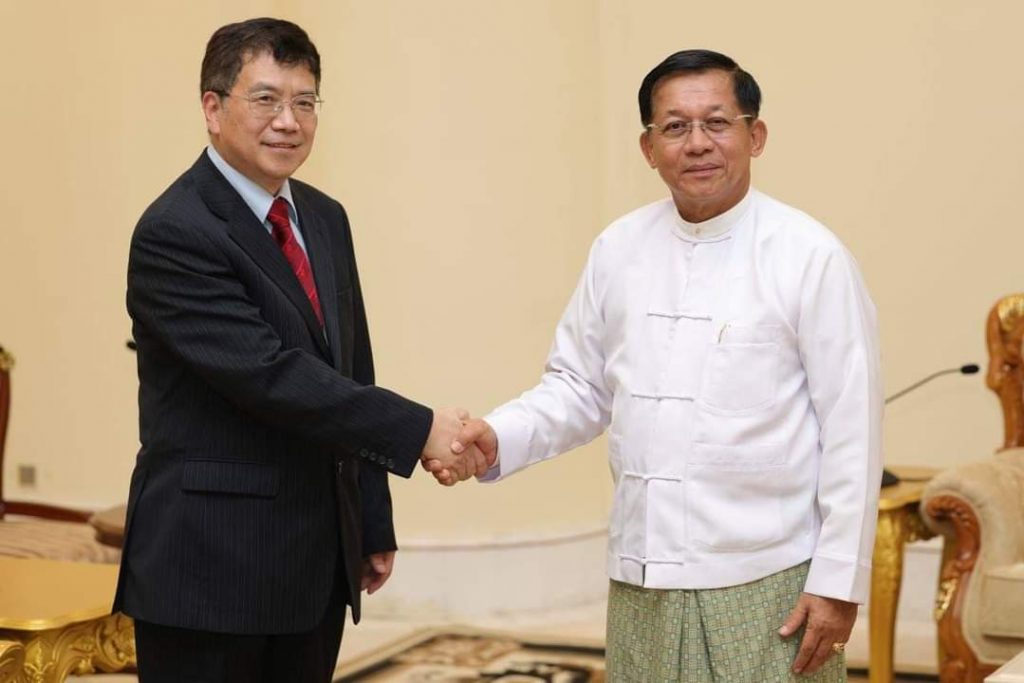
ACLED
Armed Conflict Location & Event Data Project (ACLED) report titled, “Conflict Watchlist 2023: Myanmar – Continued Opposition to the Junta Amid Increasing Civilian Targeting by the Military”, by Elliott Bynum, who is ACLED’s Asia-Pacific Regional Specialist and has been with ACLED since September 2017, initially as a Myanmar researcher, then as the research manager for ACLED’s Southeast Asia desk, writes:
“In the face of continued armed and unarmed resistance to the coup it set in motion two years ago, the Myanmar military has increasingly resorted to targeting civilians as it fails to consolidate control over the country. Civilians have been targeted not only on the ground but also through increased military airstrikes. Against the backdrop of ongoing civilian targeting, armed resistance forces that emerged after the coup have moved forward with strengthening alliances amongst themselves and with long-established ethnic resistance groups, engaging the military in battles across the country. As the military looks to eventually stage sham elections, which have been widely rejected by domestic and international groups as illegitimate, resistance to the military and its attempt to control the country is only likely to persist.”
Moreover, the report makes its grim prognosis as follows:
“While the military is still likely to continue to feign holding sham elections as a political way out of the crisis of its own making, elections are unlikely to lead to any form of rapprochement with resistance forces. The military’s refusal to relinquish power and the severe violence they continue to direct at civilian populations to keep that power means they are unlikely to adhere to any promises of reform. With the military’s ongoing targeting of those who resist its rule, 2023 will likely be a year of even further violence in Myanmar.”
The Civil War in Myanmar, 2023 Conflict Diagnostic
According to a recent study titled: “The Civil War in Myanmar, 2023 Conflict Diagnostic,” by Dr. David Carment, published by Carleton University, Canada, February 6, 2023, three scenarios have been thought of on how likely the country situation would unfold.
Part of the “Best Case” scenario writes:
“Humanitarian aid and international assistance is given to Myanmar, and the current government allows both UN and ASEAN aid to reach the most persecuted populations. The junta is more willing to listen to international actors. The upcoming elections will demonstrate greater transparency from the current government, such as media engagement and greater access to government proceedings, and will be freer. The National Unity Government (NUG) will be recognized as a political party. In accordance with this, the current military government reduces military buildup and actions, instead focusing on economic concerns.”
The “Most Likely” scenario writes:
“The NUG and SAC (State Administration Council or the military junta) both resist ASEAN-led attempts to mediate the conflict. The upcoming elections are marred by accusations of vote rigging and are dismissed as illegitimate by non-Tatmadaw parties. The NUG is denied political participation and continues to be labeled as a terrorist organization by the SAC. All factions continue to increase their military arms manufacturing, though foreign arms embargoes prevent them from acquiring the most advanced weapons and components. Nonetheless, the SAC continues its campaign of ethnic cleansing targeted at ethnic minority regions, continuing the strategy of splitting the NUG from the EAOs. The destruction of rural settlements pushes the population towards urban centers and puts increased stress on urban infrastructure and resources (particularly food supplies). This is exacerbated by the SAC’s renewed push to overexploit natural resources by reopening controversial dams and palm oil plantations, and holding gem and other natural resource auctions to fund their militarization efforts.”
And the “Worst Case” scenario writes:
“The staged elections take place in 2023 and result in the junta becoming even more authoritarian, ensuring there are no checks in place for the junta’s continued genocidal military policy. Additionally, armaments and their components will continue to flow across the border unchecked and the increased access leads to an increase in violence. This leads to a greater ethnic cleansing and an uptick of war crimes perpetuated throughout Myanmar. In this scenario, there is an increase in continued internal displacement because of violence and persecution. The state’s capacity to facilitate their population, including food supply and critical infrastructure, will continue to deteriorate.”
“As controversial development projects progress, the opponents become more radicalized and militarized as the junta disregards their needs and interests. If other states are impacted by climate disaster, it is also likely that border, rural, and ethnic communities are drawn into the conflict. Other states will be unwilling to assist with humanitarian aid because of continued conflict and persecution, including the genocide against the Rohingya.”
The reality on the ground maybe somewhere between “Most Likely” and “Worse Case” scenarios, if the prevailing conditions are of any indication.
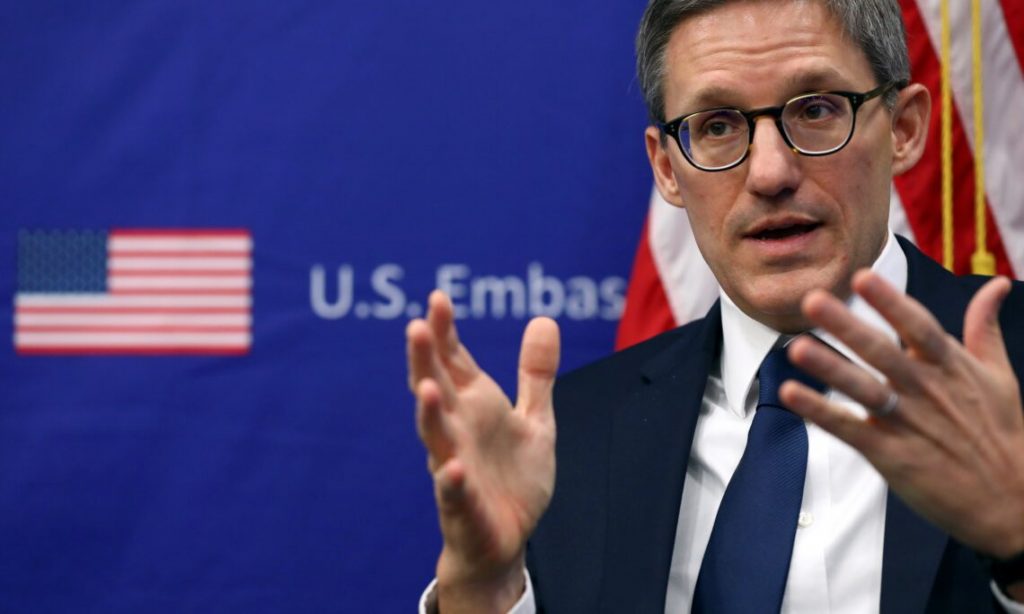
Special Envoy of the UN Secretary-General
According to the remarks by Noeleen Heyzer, Special Envoy of the UN Secretary-General on Myanmar at the General Assembly on 16 March 2023:
“The regime has accused resistance forces of violence while the National Unity Government (NUG) continues to point to the military’s brutality. The NUG has also condemned killings by the PDFs warning resistance groups not to perform inhumane acts. With both sides intent on prevailing by force, there is no prospect for a negotiated settlement.”
Junta’s offensives
The hitherto speculation and assessment of NUG and many Burma watchers that the junta’s army is spread out so thin because of the countrywide rebellion against its rule and thus cannot conduct large scale offensives, and limited to hit-and-run using attack helicopters and few dozens of airborne crack troops to raid on the positions of People’s Defense Forces (PDFs), Ethnic Armed Organizations (EAOs) including their suspected sympathetic local population, may now seem not to be the case, as it is massively reinforcing its troops and launching huge offensives in Chin, Karenni states and Sagaing Region, coupled with the mass massacre of the civilian population.
According to the ethnic armed organizations and People’s Defense Forces sources the junta since the martial law was imposed in February in 40 more townships across four regions and four states including Sagaing and Kayah and Chin states, it has been beefing up its reinforcement with some 5,000 troops in its offensives in Chin, Karenni states and Sagaing Region.
According to reliable sources and media, some 2,000 in Karenni State, another 2,000 in Chin State and another 1,000 junta troopers in Sagaing Region are said to be deployed in the ongoing offensives.
Observers said that it may be a desperate move to regain back control of the territories which are under the resistance forces, estimated to be about fifty percent of the country’s area, where the junta could control only the big towns and cities which are even been repeatedly attacked by the resistance forces.
Massacre in southern Shan State and Sagaing Region
In line with the scorched earth policy the junta to intimidate and cow the population to submission, on March 11 it massacred 22 civilians including three Buddhist monks during a raid on Nam Name Village in Pinlaung Township, southern Shan State. Since March 9 junta troopers have occupied a nearby hill raided the village on March 11, around 5 am, while a unit situated on a nearby hill shelled the village with artillery. In response, a clash broke out between resistance fighters from the People’s Defense Force and Karenni Nationalities Defense Force, which attacked the junta troops that were torching houses in the village. The resistance forces eventually retreated following the military aircraft attacks on the village. The junta troops proceeded to occupy the local monastery, where they committed torture and extra-judicial killings of the civilians, which were found out by the resistance forces the following morning when they returned. A recent report from SHAN said that 11 civilians from the village are still missing and their whereabouts are unknown.
The junta spokesman as usual denied the allegations but all evidences pointed to the handiwork of the junta, which were undeniable.
During a series of raids from February 23 to March 15 in Ayadaw, Myinmu and Sagaing townships in Sagaing Region, some crack troops of around 100 soldiers, said to be from Military Division 99, had murdered and beheaded 20 resistance members and also killed 16 civilian detainees. Three women were said to be raped before they were eventually killed according the report from The Irrawaddy.
NUG Statistics
The Ministry of Human Rights of the National Unity Government (NUG) announced on March 15 that the military junta committed 64 mass killings nationwide and 766 people were killed. This is the NUG’s list of massacres of five or more civilians between July 7, 2021 and March 13, 2023. These killings were carried out by the military junta in Kachin, Kayah (Karenni) Shan states and Sagaing Region and as well other states and regions, according to NUG’s statement.
The first killing happened on July 11, 2021 in Sagaing Division. 34 civilians were brutally killed in Yin Village in Kani Township. In 2021, nine crimes were committed and 147 people were killed.
In 2022, there were 44 cases and 515 people died.
NUG listed 11 cases and 104 people were killed during a little more than two months of 2023.
On March 2nd of this year, at least 17 local people, including a leader of the local People’s Defense Force, were arrested and brutally killed in Tataing Village, Sagaing Township.
Among those killed were 482 men, 78 women, and the remaining 206 bodies were unable to be identified whether they were male or female as they can no longer be distinguished, according to the report.
An estimated 72 percent of the killings were in Sagaing Region, claiming the lives of 478 civilians, according to the NUG’s Ministry of Human Rights.
At least 120 Kachin State civilians were killed in 2022, largely in airstrikes. Regime troops massacred 42 people in Magwe Region, 41 in Kayah State and 31 in southern Shan States last year.
Captain Natthar, who has switched to the Civil Disobedience Movement public side, said that this brutal assault is a strategy of the military council. “This brutal beheading and killing by burning are aimed to frighten the public by the cause of this war. This is mental warfare. The uniform double digits divisions from 11 to 101 were trained to attack and kill. The direct command of these divisions stems from the Office of Commander-in-Chief and Lieutenant General Soe Win usually gives orders after calling those people directly.”
NUG launched defection campaign slowing down
A recent Al jazeera reported that the NUG campaign to woo the junta’s troops to defect is slowing down and for now the junta seems to be in control of its troops.
According to Al Jazeera report of 7 Mar 2023:
“Former army captain Lin Htet Aung, a co-founder of defector collective People’s Embrace (PE), said most of the roughly 3,000 soldiers and 7,000 police officers who deserted the military did so in 2021, the first year of the coup, and the numbers have since tailed off.
Many of the military’s 120,000 combat soldiers have been incentivised to stay not just by a regular salary — prized in Myanmar’s volatile post-coup economy — but also because they can make money by extorting those who travel through the ever-increasing number of security checkpoints that have sprung up, Lin Htet Aung said.
But now, even as the bloodshed continues, the pace of defections has slowed.”
“If they wanted to defect, they’ve had plenty of time,” Maung*, a former soldier who now lives in Australia, told Al Jazeera over the phone. “It’s been two years and the military has already killed many innocent people.”
NDAA-Burma Act
The National Defense Authorization Act (NDAA) for Fiscal Year 2023 (NDAA 2023; P.L. 117–263) is signed on December 23, 2022, by President Biden. The NDAA 2023 was a modified version of the Burma Unified through Rigorous Military Accountability Act (BURMA Act; H.R. 5497) that was passed by the House of Representatives on April 6, 2022, according to Center for Strategic and International Studies (CSIS) report of February 6, 2023.
CSIS report writes:
“The NDAA’s BURMA Act contains seven separate elements pertaining to U.S. policy in Myanmar. These sections include a general statement on U.S. policy (section 5569); the authorization of the imposition of new sanctions (section 5570 and 5571); requirements for the coordination of U.S. policy (section 5572); a call for greater efforts at the United Nations (section 5573); the authorization of appropriations for assistance for Burma (section 5575, 5576 and 5577); authorization of assistance for “efforts against human rights abuses” in Myanmar (section 5578); and a limitation on the imposition of sanctions on imports from Myanmar (section 5579).”
“The statement of U.S. policy is a general statement of “support the people of Burma in their struggle for democracy, freedom, human rights, and justice.” This section calls for support of those opposing the military junta, explicitly mentioning the National Unity Government (NUG), but not the ethnic armed organizations (EAOs) or the People’s Defense Forces (PDFs). In addition, the act says it is U.S. policy to support a “credible process” for the restoration of civilian rule, reform of the Burmese military, and the protection of the rights of minority groups. It also requires accountability for perpetrators of human rights violations in Myanmar, as well as accountability for China and Russia for their alleged “support of the Burmese military.” Another component of U.S. policy, according to the BURMA Act, is the continued provision of humanitarian assistance for victims of violence still within Myanmar, as well as those in the “surrounding region.” Finally, the act calls for the unconditional release of all political prisoners in Myanmar.”
Legitimacy contest and international involvement
On political and legitimacy recognition front, both the junta and NUG, no party is winning as the UN Credential Committee hasn’t made any decision yet, even though UN Ambassador Kyaw Moe Tun, who sided with the NUG after the military coup, is still being responsible to represent Myanmar as a state, it is in no way the recognition of NUG. In the same vein, the junta’s SAC is also not recognized. Furthermore, the divided ASEAN members are still holding out not to invite the junta to its summit meeting and other high profile meetings also.
The junta seems to be having the backing of China, Russia and India. But Thailand is playing both ways which is harboring anti-junta elements and also having official relations with the junta. The reason being that it can’t go against the the U.S. anti-junta stance and at the same time cannot write off the junta for it has to depend a lot on Burma’s energy delivery which is vital to its industries and public consumption needs.
The Rohingya repatriation is being pushed by China. Some 11 ambassadors to Myanmar from different countries were even allowed to witness the interim camps set up for the purpose in Sittwe, capital of the Rakhine state, and Maungdaw, a town close to the border of Bangladesh. It is in the interest of the junta that the repatriation happens, which it has actually caused the Rohingya exodus by its genocidal undertaking on them in 2017. The junta will do everything to gain a shred of legitimacy by authorizing some of the Rohingya’s home coming.
Moreover, China seems to be changing its stance and looks like betting on the junta now by conducting meetings with the Federal Political Negotiation and Consultative Committee (FPNCC) and also with the junta recently, including its ambassador to Myanmar Chen Hai visiting the junta’s appointed Union Election Commission (UEC), after the NDAA/Burma Act legislation has been signed by President Biden in December last year.
The NUG and its EAO alliance may be morally energized by the NDAA/Burma Act legislation passed a few months ago but substantial non-lethal aids still have not been in the pipeline, except for the NUG opening of NUG office in Washington D. C. For now the US priority is Ukraine and Burma is just a back burner issue, except that it may become useful when China containment policy need to be implemented at a later date if Taiwan and South China Sea become open conflict front-line issues. For now, it can be said the US is just doing shadow-boxing, while China is not at all being idle judging from its active initiative to play mediator role in Burma’s conflict.
Meanwhile, surprisingly though, US State Department official Derek Chollet is on his ASEAN trip scheduled from 20 to 24 March, where he will meet leaders in Thailand and Indonesia, focusing particularly on Myanmar’s internal conflict and its spillover effects, according to The Strait Times report.
Domestically, the junta is gearing to hold general election during this year. But its confession that it is unable to control at least half the country’s territory and the need to hold population census in 2024 may indicate that the national election could be a long way off. This means the junta may extend its rule every six months as long as necessary repeatedly. Maybe it doesn’t care much about achieving legitimacy so long as a handful of countries such as China, Russia, India, Japan and Thailand are recognizing it and doing business with its regime. The bottom line is that it still is partially in the driver’s seat of the country if not hundred percent in control, no matter how illegitimate and unacceptable to the people it wants to rule and also notwithstanding the objection of international community.
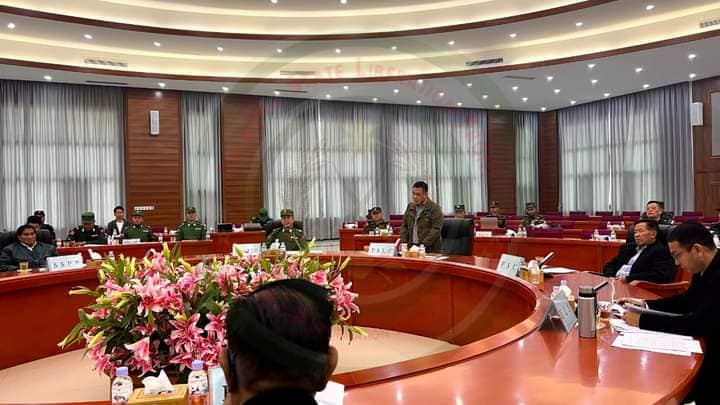
Perspective
All facts are pointing towards more war and no dialogue so far as the junta and the ethnic-democratic alliance or NUG and its EAO allies are concerned.
The junta is thinking that it can win and has the military advantage to do so. On the other hand, the ethnic-democratic alliance also think that the majority of the people are on its side and the Spring Revolution is gaining momentum, so much so that the NUG declared that 2023 will be a decisive year and all the alliance members issued statements to speed up the revolution and topple the military dictatorship in 2023, even though it still cannot match the junta’s military machine.
Thus to change the military balance, the ethnic-democratic alliance may need external help, as U.S. Intelligence Community, Office of the Director of National Intelligence has rightly pointed out in its recent report.
While the domestic players are at loggerhead and there seems to be no space for political settlement negotiation, the U.S. and China are starting to make moves, either aiming to hold peace process dialogue or empowering a particular adversary group to change the military and political balance, rather than enduring the present stalemate, deadlock situation.
Accordingly, China has already talked with the junta and also the FPNCC, of which it has a lot of leverage on both parties, to interact with one another and offered to be the mediator for a win-win outcome. China’s interest is to be able to carry on with its Belt and Road Initiative (BRI) projects and may have finally made up its mind to bet on the junta by coaxing the FPNCC to work with it.
As for the U.S. after the NDAA/Burma Act legislation become law, it hasn’t done much except for opening a NUG office in Washington D.C. The U.S. State Department official Derek Chollet recent trip to some ASEAN capitals may perhaps be a counter move in the face of China’s assertiveness concerning Burma’s conflict or civil war.
Meanwhile, on March 22 Reuters reported the United States will announce further sanctions against entities inside Myanmar in the coming days. U.S. State Department official Derek Chollet said the sanctions will make it more difficult for Myanmar’s junta to generate revenue to buy weapons.
And with Xi Jingpin cosying up with Putin, which may be seen as forming alliance against the West and U.S., the conflict in Myanmar may also become an arena where the China containment policy will be played out. But of course Taiwan and South China Sea issues will still be the major contending issues, much bigger than the Burma’s civil war.
In sum, in the aftermath of Derek Chollet ASEAN visit, the U.S. maybe compelled to up the ante, with appropriate response, on Burma issue to be in par with China, whether it is to its liking or not.





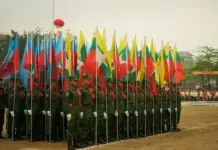

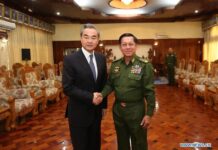
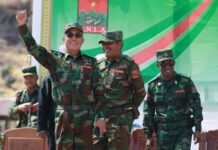






Leave a Comments